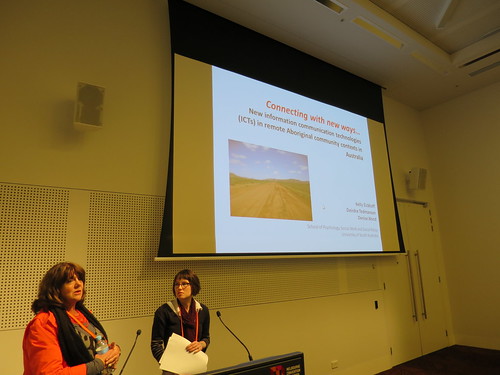Paper presented at #husITa14 in Melbourne, Australia, July 2014.
Presenters
Deirdre Tedmanson (University of South Australia, Adelaide, Australia).
Abstract
For remote Aboriginal communities in Australia, the increased use of and access to, new information communication technologies (ICTs) is an important social justice issue in terms of: sustaining important family and kinship relationships, facilitating transactions, overcoming the challenges of distance to access essential services, accessing information and knowledge, and participating in broader Australian and global society in ways that strengthen and maintain cultural agency. This presentation discusses the findings of a participatory research study which explored the perspectives of students, workers and community members in an Australian remote Aboriginal community, towards increased use of personal information communication technologies (ICTs) in their communities.
The study aimed to develop new social work knowledge about the potential social impacts of new ICT use (including social media applications) in remote community contexts. Its findings point to a range of social justice issues arising from increased reliance on ICTs in what are often poorly serviced communities lacking adequate or reliable infrastructure; while also challenging prevailing assumptions around digital and social exclusion.
By un-packing the dominant, often oppressive systems and models of ICT use and access that may not easily fit remote Aboriginal community contexts, the presentation will emphasise the insightful perspectives of local people about both positive and negative impacts of a rapidly changing communications environment. Despite many complex issues about personal ownership and use of computers, such as kinship obligations, high cost relative to low incomes, and lack of technological support, there was a strong emphasis in the data on the strengths that can accrue from the greater availability of new technology; and community confidence about capacity to tackle any problems that arise. The presentation will highlight areas for further research in this emerging field of Social Work policy and practice.
Comments
Please use the reply section below to comment and discuss this paper.
Back to programme

